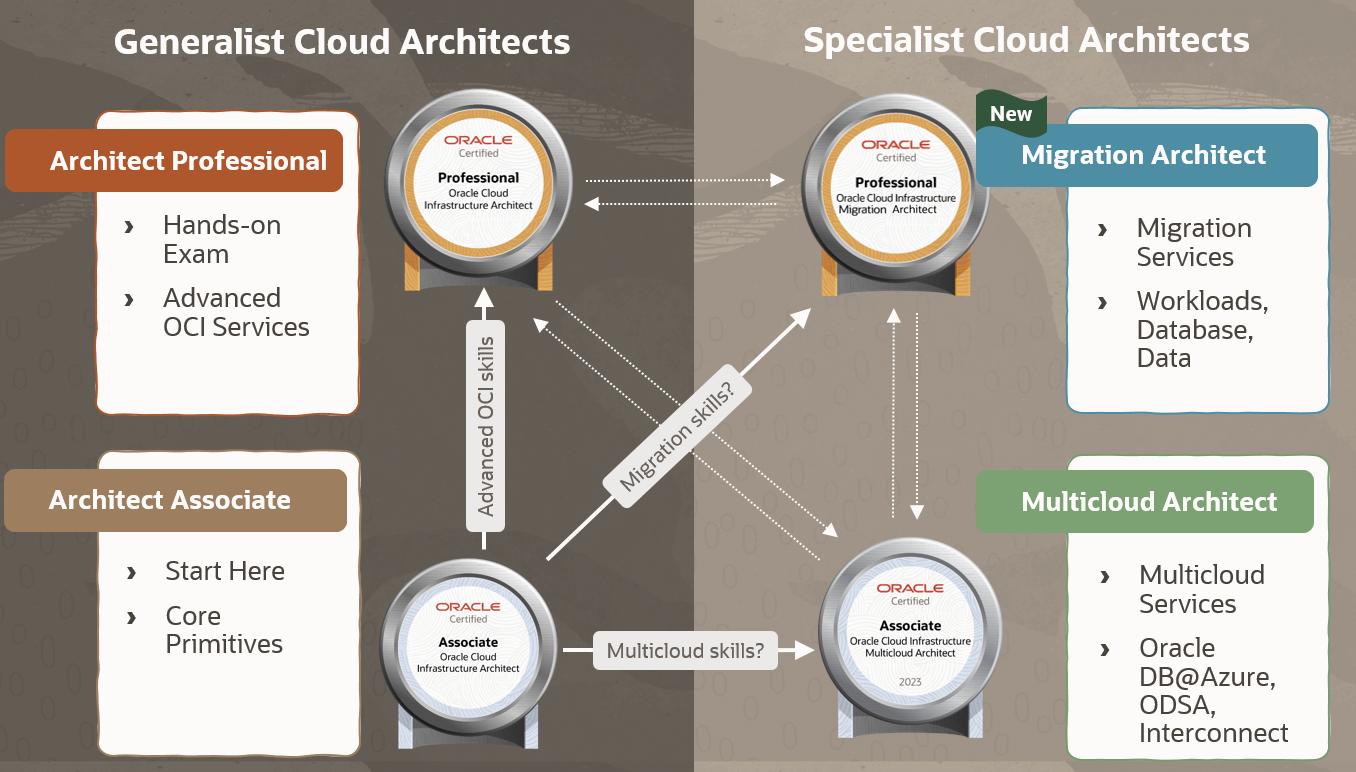We are thrilled to unveil the general availability of the OCI 2024 Migration Architect Professional Certification. This certification is specifically designed for cloud architects aiming to excel in the design and migration of workloads to Oracle Cloud Infrastructure.
The imperative for Migration Architects
Consider a scenario where your CIO mandates a seemingly straightforward objective: “Migrate applications to the cloud.”
As a cloud architect, you are presented with a gamut of strategies: should you opt for a rehosting approach in the cloud (commonly referred to as lift-and-shift), refactor (to modernize the application architecture), or repurchase (substitute an on-premises application with a cloud-based SaaS solution)? Certain migration processes may appear direct—for instance, rehosting allows VMware workloads to transition from an on-premises vSphere environment to a VMware based public cloud solution with minimal alterations. Replatforming might involve substituting specific layers in the application stack with managed services. However, more intricate migrations, such as the advanced refactoring from monolithic applications to microservices can be complex, costly, and time intensive.
Your decision-making must be grounded in an in-depth understanding of your organization’s requirements, evaluation criteria, and architectural principles. It’s crucial to recognize that no single approach provides a panacea; each alternative necessitates a comprehensive grasp of application migration from various angles and criteria.
Organizations are increasingly migrating IT workloads to the cloud to leverage benefits such as enhanced agility, reduced costs, elastic scalability, advanced automation, and continuous innovation. Despite this trend, a significant portion of workloads remain within on-premises data centers. According to Gartner[1], a predominant barrier to infrastructure modernization initiatives is the scarcity of requisite skills, compelling many organizations to acknowledge the challenge of bridging these skill gaps externally. To navigate migration and modernization endeavors successfully, IT organizations must prioritize the cultivation of skills internally.
In light of this, we are excited to offer this industry-leading certification, uniquely focused on migration and infrastructure modernization within the OCI ecosystem.
Elevating the expertise of OCI Cloud Architects
The role of the cloud architect has undergone significant evolution in recent years. Mastery of core cloud technologies, while essential, is no longer sufficient. Today’s cloud architects must also possess expertise in designing and managing hybrid and multicloud environments, in addition to migration and infrastructure modernization. The OCI certifications and skilling programs have been meticulously designed to mirror this expanded scope of expertise.
As shown below, our architect certifications and courses are categorized into two broad segments: Generalists and Specialists. OCI generalist cloud architects boast comprehensive knowledge across core OCI services, including compute, storage, networking, database, security, cloud-native, and automation technologies. Meanwhile, specialist cloud architects are distinguished by their proficiency in designing hybrid and multicloud architectures and in migrating workloads, data, and databases to OCI.

We suggest beginning your journey with the OCI Architect Associate certification to acquire essential knowledge and skills pertaining to core OCI primitives. Subsequently, you may opt to advance your expertise by pursuing the Architect Professional certification, thereby deepening your understanding of OCI services.
Alternatively, if you seek proficiency in multicloud environments, the Multicloud Architect certification offers a tailored pathway to hone your skills in this domain. For those keen on acquiring practical insights into OCI migration solutions, the Migration Architect certification provides invaluable hands-on experience and expertise in designing and implementing migration solutions in OCI.
OCI Migration Architect Certification and Course Overview
The OCI 2024 Migration Architect Professional Certification is meticulously crafted to equip individuals with the skills necessary for designing and implementing solutions for cloud migrations utilizing OCI services. Achieving this certification demonstrates an advanced proficiency in orchestrating Oracle cloud migration solutions.
This certification is tailored for IT professionals involved in the transition of workloads to OCI. Ideal candidates will have a foundational understanding of on-premises VMware-based environments and database deployments, coupled with at least six months of hands-on experience with Oracle Cloud Infrastructure. Upon course completion, participants will have acquired:
- A foundational understanding of migration fundamentals, scenarios, and workflows.
- Proficiency in OCI Networking services essential for migration.
- In-depth knowledge of the Oracle Cloud VMware solution for VM migrations to OCI.
- Expertise in Oracle Cloud Migration services to design and implement migration strategies.
- Familiarity with the Oracle Container Engine for Kubernetes, facilitating the migration of containerized applications to OCI.
- Insights into on-premises data migration strategies to OCI.
- Comprehensive understanding of the array of database migration services available in OCI.
The OCI 2024 Migration Architect Professional Certification focuses on building skills for designing and implementing migration solutions leveraging OCI services. By attaining this certification, individuals can showcase advanced knowledge and skills in designing and implementing Oracle cloud migration solutions.
The OCI 2024 Migration Architect Professional Certification exam assesses learners’ understanding of these topics and their ability to design and implement them. Here is a breakdown of the exam objectives:
| Objectives |
% of Exam |
|
| Objective 1: Fundamentals of Cloud Migrations |
10% |
|
| 1.1 |
Explain the fundamentals of cloud migrations |
|
| Objective 2: OCI Networking services for migrations |
5% |
|
| 2.1 |
Explain the fundamentals of OCI Networking services |
|
| 2.2 |
Understand OCI Connectivity options |
|
| Objective 3: Design and implement migrations using Oracle Cloud Migrations service |
20% |
|
| 3.1 |
Explain the fundamentals of Oracle Cloud Migrations service |
|
| 3.2 |
Design and Implement Discovery, Inventory, Planning and Assessment tasks for migration |
|
| 3.3 |
Perform Replication and Execution tasks for migration |
|
| Objective 4: Design and implement migrations using Oracle Cloud VMware Solution (OCVS) |
15% |
|
| 4.1 |
Perform source discovery to understand infrastructure resources in on-premises environment |
|
| 4.2 |
Design the Target OCVS environment based on migration pre-requisites |
|
| 4.3 |
Perform migrations using Hybrid Cloud Extension |
|
| Objective 5: Migrate containerized applications to OCI |
10% |
|
| 5.1 |
Explain the fundamentals of OCI Container Engine for Kubernetes and Oracle Cloud Infrastructure Registry |
|
| 5.2 |
Understand the Phases involved in migrating containerized workloads to OCI |
|
| Objective 6: Migrate infrastructure workloads between OCI regions |
15% |
|
| 6.1 |
Understand OCI Object Storage Replication and Object Copy |
|
| 6.2 |
Implement OCI Block Volume Replication |
|
| 6.3 |
Implement OCI File System Replication |
|
| 6.4 |
Design and implement OCI Full Stack Disaster Recovery Service |
|
| Objective 7: Implement migration methods for secure and efficient data transfer to OCI |
10% |
|
| 7.1 |
Migrate data using the OCI Data Transfer service |
|
| 7.2 |
Implement OCI Storage Gateway |
|
| Objective 8: Migrate Oracle Databases to OCI Database Services |
15% |
|
| 8.1 |
Analyze and design a successful database migration plan |
|
| 8.2 |
Explain the different methods for migrating to OCI database services |
|
Successfully completing this course and passing the certification exam will empower you with the skills and knowledge to design and manage effective migration solutions utilizing OCI services. Furthermore, you will obtain a prestigious credential, underscoring their expertise in this domain.
Our integrated learning platform offers an immersive experience, encompassing video courses, skill checks, exam preparations, practice exams, online certification exams, credentials, and more. To optimize your learning experience, we recommend engaging with the platform as follows:
- Ask your instructors: pose questions and receive responses from instructors or peers within 24 hours.
- Take detailed notes: access video transcripts in 29 languages to follow along in your preferred language.
- Complete Skill Checks: validate your understanding before progressing to subsequent modules.
- Engage in Exam Preparation: leverage valuable insights and tips through the exam preparation lesson.
- Practice Exam: gauge your exam readiness with practice exam.
- Join the OCI Learner Community: exchange knowledge and queries with the broader OCI community.
- Provide Course Feedback: share your insights and suggestions for course improvement.
Get Started
- Access learning path: OCI 2024 Migration Architect Professional
- Review Exam (1Z0-1123-24) topics: OCI 2024 Migration Architect Exam
- Register and schedule your Exam (1Z0-1123-24): OCI 2024 Migration Architect Professional (1Z0-1123- 24)
This certification course and exam would have not been possible without the help of a great group of Oracle University domain experts and OCI Migration Services PMs. The following experts contributed to this project:
Subject Matter experts and instructors (Samvit Mishra, Tijo Thomas, Rashmi Panda, Mahendra Mehra), Program Management (Tamal Chatterjee), Studio (Deepak Modi, Selvaraj Natarajan, Shankar Ghatwar, Vidyashree RS), Graphics (Kavya Bellur), Publishing (Pavithran Adka, Srividya Rameshkumar), and Certification (Shafi Ahmed, Geetha Lobo, Mike Randall)
Thank you for considering the OCI 2024 Migration Architect course and certification exam. We wish you the best of luck in your journey towards becoming a certified OCI Migration Architect.
